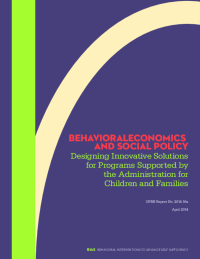Behavioral Economics and Social Policy
Designing Innovative Solutions for Programs Supported by the Administration for Children and Families
The Behavioral Interventions to Advance Self-Sufficiency (BIAS) project is the first major opportunity to use a behavioral economics lens to look at programs that serve poor and vulnerable people in the United States. Sponsored by the Office of Planning, Research and Evaluation of the Administration for Children and Families (ACF) within the U.S. Department of Health and Human Services, the BIAS project aims to learn how tools from behavioral economics can improve the well-being of individuals and families served by programs that ACF supports. Many human services programs require clients to make active decisions and follow a series of steps in order to reap a benefit — from deciding to apply, to completing forms, to arranging for child care. Program designers often assume that individuals will carefully consider options, make decisions that maximize their well-being, and diligently follow through. Behavioral economics, which combines insights from psychology and economics, may help explain why these assumptions are not always borne out.
By describing work in three sites, this report illustrates how the BIAS project draws on the principles of behavioral economics to design solutions for ACF programs. In partnership with program administrators, the BIAS team uses a method called “behavioral diagnosis and design” to delve into problems that program administrators have identified, diagnose potential bottlenecks that may inhibit program performance, and identify areas where a relatively easy and low-cost, behaviorally informed change might improve outcomes.
Working with the Texas Office of the Attorney General´s Child Support Division, the BIAS team explored ways to increase the number of incarcerated noncustodial parents who apply for a modification of their child support order, with the goal of preventing further accrual of child support arrears. The project team also engaged with the Illinois Department of Human Services and one of its job search contractors to identify behavioral interventions that could help increase the rate of engagement in job search assistance among clients who receive Temporary Assistance for Needy Families. Finally, work with the National Domestic Violence Hotline (NDVH) focused on reducing the number of callers who reach a hold message but hang up before talking to an NDVH staffer.
Key Findings
- The behavioral diagnosis and design process provides a means of identifying and addressing key reasons that programs may not be performing to expectation. The process can uncover behavioral bottlenecks that are amenable to behavioral solutions. It may also identify structural issues, such as a need to hire more staff, which are often outside the scope of the BIAS project.
- The diagnosis process encourages program designers to step back and examine multiple possible explanations for underperformance before embracing a particular theory or solution. This may improve the likelihood of success of any behavioral intervention.
As the project moves forward, the BIAS team will continue to work with public officials to design and apply behavioral interventions in ACF program areas to generate new ways of tackling problems. Promising interventions will be tested using rigorous research designs, employing experimental methods to reliably determine the impact of an intervention. Future publications will report the impacts of these interventions.
* * *
Sign up here for Behavioral Buzz, the quarterly newsletter of the Behavioral Interventions to Advance Self-Sufficiency (BIAS) project, which is funded by the Administration for Children and Families’ Office of Planning, Research and Evaluation. The goal of BIAS is to adapt and apply tools from behavioral science to improve the well-being of low-income children, adults, and families






